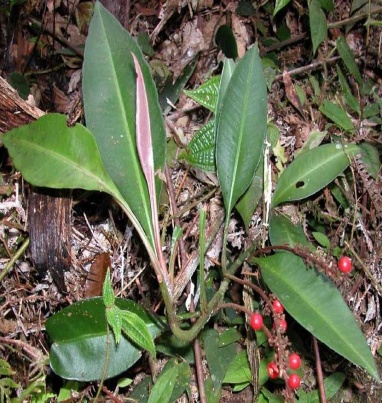Introduction
Kacip Fatimah is a herb that grows on forest floors. The most common species normally found in Malaysia are var. Alata, var. Lanceolata dan var Pumila. Kacip Fatimah is also locally known as Selusoh Fatimah, rumput Siti Fatimah, akar Fatimah, kacit Fatimah, kacip Patimah, kunci Fatimah, pokok pinggang, rumput palis, tadah matahari, mata pelanduk rimba, bunga belungkas hutan, remoyan batu or Sangkoh.
Kacip Fatimah is historically used for womens’ health. Traditionally, Kacip Fatimah is used to facilitate delivery and is used as a medicine during confinement.

Labisia pumila var. Pumila (foto daripada www.mytreesdata.info)
Kacip Fatimah Usage
According to traditional practice, the whole part of the Kacip Fatimah herb will be boiled with other herbs for the well being of women. Kacip Fatimah can also be found in many health food and beverages. In the pharmaceutical arena, Kacip Fatimah can be found in many dosage forms such as in capsules, tablets and herbal teas.
Types of claims allowed
Permissible indications allowed for products containing Kacip Fatimah include claims made for the general health of women such as to strengthen the body after delivery, to reduce vaginal discharge and to improve menstrual flow. These claims are allowed as long as they are supported by references from books, herbal pharmacopoeias or clinical studies.
Generally, Kacip Fatimah is added to many medicinal products and health beverages due to its nutritional value which benefits womens’ health. This has made Kacip Fatimah attractive for both local and international researchers to further investigate its therapeutic benefits. Other than its use to facilitate delivery and during confinement, there are oncoming clinical studies that are showing positive results on the potential use of Kacip Fatimah as having anti oxidant and anti-ageing properties. Many local manufacturers have added Kacip Fatimah into health food and beverages due to these findings. However, these have not been supported by any clinical studies on humans.
Warning and precautions
For any traditional medicines to be marketed in Malaysia, the company has to obtain prior approval from the Drug Control Authority (DCA). This is to ensure that the products marketed are of quality and safe for consumption. Consumers can check whether the product has been registered with the Ministry of Health (MOH) by searching for the registration number (MAL number) which will be printed on the product label.
Even though, Kacip Fatimah has been used traditionally, there are limited clinical studies conducted to prove its long term use. Therefore, consumers are advised to consult their pharmacist or healthcare professional if symptoms of their illness persist or worsen after consuming any medicinal product, health food or beverage containing Kacip Fatimah.
References
- Herbal Medicine Research Centre, Institute for Medical Research. Compendium of Medicinal Plants in Malaysia (Volume 2) (2002). Kuala Lumpur, Malaysia: Herbal Medicine Research Centre (HMRC), Institute for Medical Research (IMR).
- Melissa P.S.W, Navaratnam V. & Chia Y. Y. (2012). Phytoestrogenic property of Labisia pumila for use as an estrogen replacement therapy agent. African Journal of Biotechnology, 11 (50), 11053-11056.
- Norhazlina A.W, Wan Hafizah W.Y, Ahmad Nazrun S. & Wan Nazaimoon W.M. Labisia Pumila has Similar Effects to Estrogen on the Reproductive Hormones of Ovariectomised Rats. The Internet Journal of Herbal and Plant Medicine. Retrieved on 18 April 2013 from http://www.archive.ispub.com
- Global Information Hub on Integrated Medicine. Kacip Fatimah.Retrieved on 18 April 2013 from http://www.globinmed.com/index.php?option=com_content&view=article&id=83457:kacip-fatimah&catid=123:plant-list&Itemid=132
- National Pharmaceutical Control Bureau, Ministry of Health, Malaysia. Drug Registration Guidance Document. Retrieved on 18 April 2013 from http://www.bpfk.gov.my.
| Last Reviewed | : | 02 January 2015 |
| Writer | : | Noor’ain bt. Shamsuddin |







